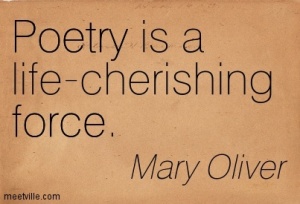
This is my second poetry venture on the local scene (See my posts on our art gallery open mic called Poetry Under the Paintings, which I was so lucky to be asked to help organize), and I couldn’t be happier with the decision, or more grateful that a local art gallery and library are open to hosting a place for the art of poetry.
As I said before, not knowing how the demographics would pan out–writers, enthusiasts, newbies, or old pros–I decided to take a broad approach to the first meeting, sort of a getting acquainted with poetry session, or getting reacquainted, without any pressure to write or analyze. Not yet. So in that spirit I had us dive into a pool of poems, just to feel the cool and enjoy the swim.
What is poetry?
We started with “Introduction to Poetry,” by Billy Collins, and from there traveled the poetry spectrum from the free-verse of E. E. Cummings (Yes, he did spell it that way) to the structure of a Shakespearean sonnet. The original thought was to discuss the questions, “What is poetry?” And “Where does it come from?” But the discussion flowed more in the direction of “What is poetry” as it relates to why so many people claim to not like it.
We looked at a lot of definitions of poetry that various poets have given over the years. As Billy Collins has said, “Poets are people not content to say only one thing at a time.” Poets love language so much, and the things it can do in describing the breadth of the human heart, that they are often not content to give a precise definition. Ambiguity is a friend of poets, and this is part of poetry’s magic, all the possibilities, the many angles one light can reflect off a bit of broken glass.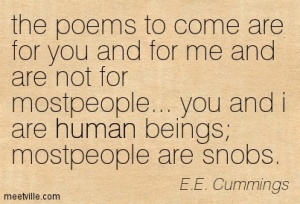
So how to tell you about the rest of the meeting? A whirlwind of audio, visuals and reading poems out loud. I think I’m going to just give you the links below, and rather than write a detailed essay or share my clumsy notes, I’ll just give you a little brief context. The links we actually used in the meeting will be in bold.
We discussed multiple reasons why people do not like poetry. Some tell me it is because of what they learned or did not learn about it in school, or how it was handled. In fact I had another library staff member tell me, only a tad facetiously, as she started quoting from Chaucer’s “Prologue to the Canterbury Tales,” that having to memorize it was probably precisely why she didn’t enjoy poetry! We mentioned opinions from Dan Gioia’s “Can Poetry Matter” essay to recent Pulitzer Prize winner Vijay Seshadri’s assertions that we now live in “a golden age for poetry.”
Perhaps it is a disconnect between academia and the man on the street. As Tim Green, editor of Rattle Magazine recently said on Facebook:
By entering academia, poets anointed a priestly class where a literary elite claim the right to mediate our relationship with poetry. Unsurprisingly, it’s become a bloated, self-serving bureaucracy, and that’s why the broader public has turned away.
I encourage you to add them on Facebook (Tim Green is the editor and makes all the tweets and status updates), in order to see the rest of his brief essay on July 20th. It’s a mere three paragraphs and worth a read.
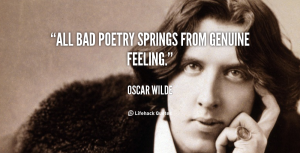 Some of the tension comes because of the distance between greeting card verse, the maudlin cliches of what pass for love poems, and the more craft-focused art of translating the emotions of the heart in more original metaphors.
Some of the tension comes because of the distance between greeting card verse, the maudlin cliches of what pass for love poems, and the more craft-focused art of translating the emotions of the heart in more original metaphors.
And perhaps there is something of a poetic generation gap problem. Much of the quibble over free-verse versus traditional metered rhyme is because a great deal of what has been written since Pound’s time has not the musical lilt that your grandparents are accustomed to. It doesn’t matter how many modern rhyming poets you mention to some people, they still want to know, “Why doesn’t poetry rhyme anymore?”
Of course we don’t sound like Shakespeare these days because the language has evolved. And we certainly don’t sound like Robert Burns!
Poetry in pop culture:
Do you remember the movie “Four Weddings and a Funeral?” Do you recall this poem by W. H. Auden? I’ve never seen the whole movie, but this reading rips my heart out every time. The thing many don’t realize is that the original poem, was written as a satirical cabaret number in 1936. I’m not sure how much of it changed before it was published in print in 1938, but you must admit, it takes the very intense and honest feelings of the bereaved and puts it into some clever lines that hit home. Perhaps the difference between sappy and soulful lies a bit in presentation?
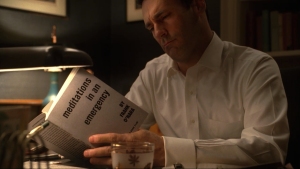
More recently, in season two of the hit TV show “Mad Men” we see establishment guy, model advertising executive Don Draper getting in touch with his poetic side. He is seeing a girl who hangs out among the beat poets and artists in The Village, and he gets his hands on Frank O’Hara’s latest book Meditations in an Emergency. He thinks to send the book to her as actor John Hamm’s rich voice recites part of “Mayakovsky.”
From the fictional 1960’s to the real 1960’s we find Ken Nordine doing what he called “Word Jazz,” basically poetry to the play of improvisational jazz musicians. Here is his piece, with modern visual interpretation, “Green.”
Care to venture a guess at the relation between Ken Nordine’s color poem and the “Mad Men” scene? When Nordine’s color poems–there was a whole series–were heard on the air Disc Jockey’s couldn’t replay them when requested because they were actually advertisements. “The Fuller Paint Company invites you to stare with your ears at yellow.” Very Mad Men-ish, no?

While we are on the advertising topic let’s skip ahead to this very recent (last year I believe) advertisement for Dewar’s Scotch which is powered by YouTube poetry-reading legend Tom O’Bedlam’s rendition of Charles Bukowski’s “So You Want to Be a Writer.” The debate still rages. Anti-establishment poet gets his work stolen and used for commercialism. Baloney! Bukowski loved his drink, and his widow was paid for the use of this poem. Meanwhile more of the general public who otherwise wouldn’t pick up a book of poetry got exposed to a great piece, read by an awesome voice.
And maybe, just maybe these ipod and liquor adverts, displaying what happens when poetry is read out loud and well, will begin to convert a few who thought they didn’t like the art at all.
Aside from that we discussed the need to not take Bukowski’s claims in that poem too far. I found the original commentary from Tom O’Bedlam on this topic here. It’s well worth reading, so I’ll give you a teaser excerpt:
Don’t buy it. This is Charles Bukowski telling Charles Bukowski how to write like Charles Bukowski. He’s guilty himself of all those sins he’s admonishing you against as an aspiring writer.
You might have a natural inborn talent as a writer – or, for that matter, as a plumber or a portrait painter – but that’s not the way to bet. You can’t rely on raw talent. It’s nice to be a genius of course (did somebody else use that phrase?) but most people have to learn their trade or profession.
Back to that generation gap problem. We’ve been jumping around a lot here, from Chaucer and Burns to O’Hara an E.E. Cummings, back and forth in time, over and returning across the Atlantic. But what do these pieces have in common? What is it that makes a poem a poem? Sure, some modern poems don’t rhyme, but face it, neither does Beowulf. And only recently have I realized, thanks to John Nooney’s Poetically Versed blog, that the prose poem has a long history, despite my desire to define poetry by the line.
And I still contend that most poetry is lined, and that despite my love for Zachary Schomberg’s “Testy Pony,” prose poetry might just be a hybrid genre all its own. While some argue that modern free-verse is just prose in lines, I insist that pieces like Schomberg’s “Pony” are poems that look like prose.
And so instead of answering you straight out like a scientist, I’ll quote a poet who gives my favorite definition of poetry:
The wrap up:
So that’s all the answer I’ll give for now. And maybe that’s all we need. Follow along here on the blog, or if you are nearby on the map come to the Priestly-Forsyth Memorial Library on the first and third Tuesdays each month and explore the topic with us.
A few other audio visual highlights from the evening include this interpretation of Shakespeare, by Mathew MacFadyen, and also his reading of “When You Are Old,” by Yeats. A few posts back here on the blog you can also see his portrayal of William Carlos Williams’ “This is to say,” and Samuel West’s “Proposal,” written by Tom Vaughan from the BBC’s “Poems to Fall in Love to.”
Next time we’ll be reviewing the first few chapters of Mary Oliver’s A Poetry Handbook, and discussing where poetry comes from, it’s sounds and how meaning is intricately connected with sound.
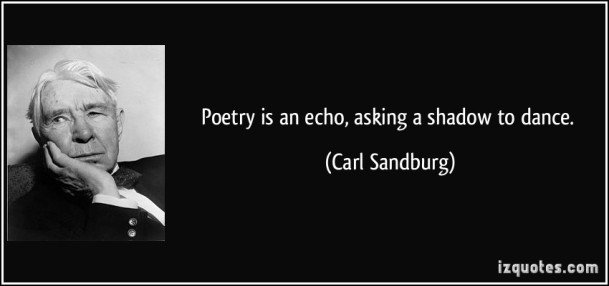





Very informational post.
I really do agree whole-heartedly with both Gioia and Green — academia is holding poetry hostage.
And, because I love you so much, I will forgive your for spelling my last name wrong ….
….and, also, in that same spirit of love, I will refrain from jokes about the “beet” poets…. except to say I am rather surprised there is a group of poets who dedicate their craft to beets… its all very earthy and New Age.
🙂
LikeLike
Oh sigh. Sitting here doing editing of this monster, and you know how much it messes up the formatting every time I click edit?
LikeLike
I can live with my name being misspelled … however, I think one must risk messing up the formatting to get rid of the beets…. one’s credibility is at stake …
I think I may try to write an Ode to the Beet Poets …
LikeLike
Oooh, I could slap you. LOL Already working on fixing both, silly. :-p
LikeLike
P.S. If you’re going to listen to readings … you may have already heard this … but I think this is wonderful http://hxcfairy.tumblr.com/post/58647037995 (Tom Hiddleston reading E E Cummings)
LikeLike
I will check it out, AFTER I beet you silly, Mr. Noonie!
LikeLike
Excellent reading she me!
LikeLike
And I should mention that another member read “Testy Pony.” We did not show any of my own videos. My ego has to be reined in somewhere. 🙂
LikeLike
Thoughtful post…good quotes…continued good luck and fun with it all….k
LikeLiked by 1 person
What a great post…I dream of the day when poetry will have a comeback as it was in the 40″s and it was a part of merging American society. if you have a chance check out my “coffee table” books now at Amazon: http://www.amazon.com/s/ref=nb_sb_ss_c_0_11?url=search-alias%3Dstripbooks&field-keywords=ann%20johnson-murphree&sprefix=ANN+JOHNSON%2Caps%2C346
I can only dream of the day my home town will embrace a poetry group. Thank you again for allowing me to merge myself into your blog. Ann
LikeLiked by 1 person
Thanks for adding your voice to the discussion. 🙂
LikeLike
Welcome! 🙂
LikeLike
i agree will all that you have written.Take a look at the poetry event i run, Rhyme and Real Ale it is a year old this year all ages and gender read out, from 20 to 30 readers. The group page and event page is on FB I have 120 members.
LikeLike
Wonderful! Thanks for sharing it. 🙂
LikeLike
Another wonderful post David! And wow.. that Emily Dickinson definition of poetry really nails it for me. I love the passion for poetry you help ignite with your blog here. Well done! Cheers, Gina
LikeLike
Hers is my favorite among these “definitions” too, Gina. Thank you for being such an encouragement!
LikeLike